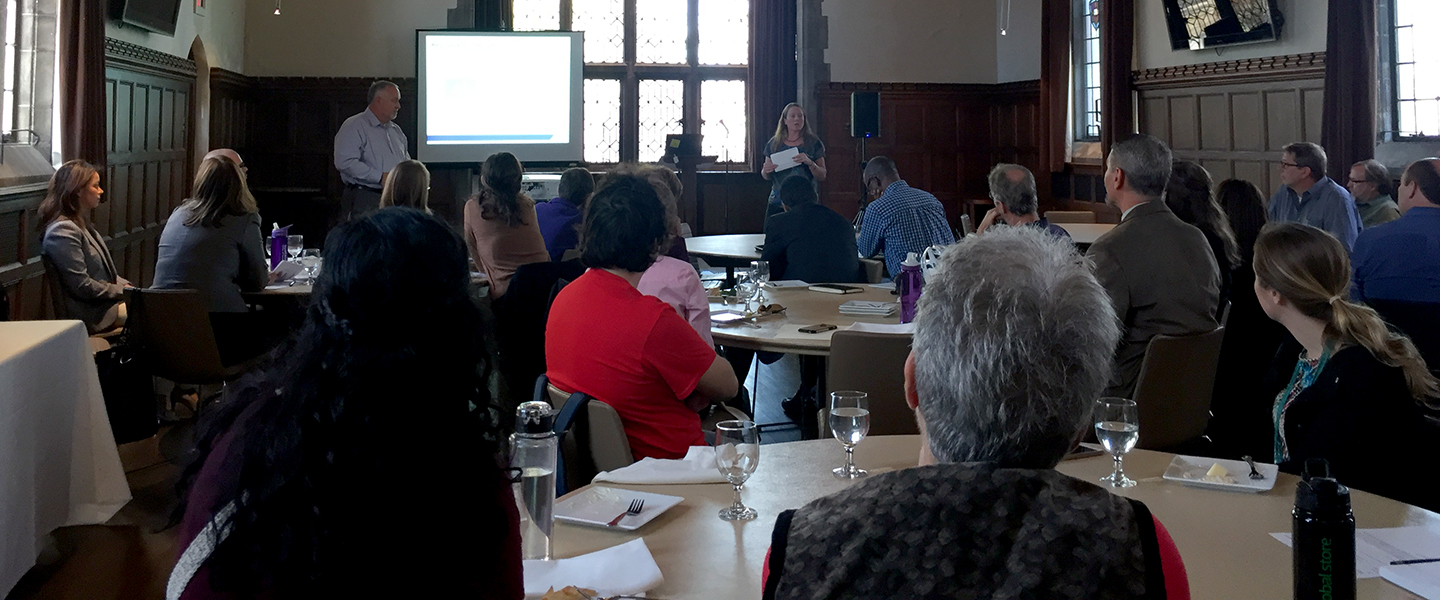
Sustainability Working Groups Share Progress and Plans
Northwestern has set ambitious goals for creating an environmentally sustainable campus, and students, faculty, and staff members from across the University are mobilizing to take action to achieve these goals. Five Sustainability Working Groups are tasked with overseeing the implementation of sustainability initiatives, and these groups recently gathered to share updates on their plans for the coming year. Here are some highlights from each of the working groups.
The Built Environment
The Built Environment Working Group is focused on a benchmarking analysis and greenhouse gas emissions reporting effort. The process will provide an inventory of the University’s energy and water consumption and will measure several other sustainability initiatives against peer and best-in-class institutions.
The resulting report will provide normalized energy use intensity, defined as total annual energy use in thousands of British thermal units (kBtus) divided by the square footage of the building. Also, the report will inventory the University’s greenhouse gas emissions associated with sources including buildings, vehicles, purchased electricity, escaped gases, business operations, employee commuting, and business travel.
The benchmarking process will provide information that the University will use to identify opportunities to reduce energy use, set goals, and evaluate progress. The process will also inform the development of the University’s climate action plan, which will serve as a roadmap for reducing greenhouse gas emissions.
Other major projects underway include the implementation of a Strategic Energy Management Plan that focuses on reducing energy use in existing buildings.
Transportation
The Transportation Working Group is administering a campus-wide Transportation Survey with support from the Office of Institutional Research. The survey will benchmark data that speaks to our campus commuting habits, awareness of our transportation initiatives, and the total greenhouse gasses tied to our travel patterns. The group will use the results to develop strategic initiatives that will provide more convenient and sustainable options for moving to, from, and around campus.
The working group is also pleased to announce that Northwestern has been named a Bicycle Friendly University at the Silver level by the League of American Bicyclists. This is Northwestern’s first time receiving this designation. Also, the City of Evanston was recognized as a Silver Level Bicycle Friendly Community.
Resource Conservation
The Resource Conservation Working Group is in the process of planning for a waste audit. The audit will provide insight into the waste generated on campus, making it possible to identify which items in our waste stream could be eliminated, reused, or recycled.
Other major projects this year include developing sustainable purchasing and procurement guidelines. These guidelines will make it easier to recognize and prioritize more sustainable suppliers and products when making University purchases.
Additionally this working group is tasked with addressing sustainable food initiatives. One effort already underway is the Real Food Challenge, a commitment to purchase 20 percent real food by 2020. The group is also working to identify practices that might not fall within the parameters of the Real Food Challenge, but that nonetheless reduce the impact of our food purchases and enhance availability of more sustainable and healthier options.
Curriculum and Research
The Curriculum and Research Working Group is focused on developing a living laboratory program that connects students with experiential learning opportunities. Examples of projects that the group plans to support include House by Northwestern, a student project to design and build a solar-powered house and enter it in the U.S. Department of Energy Solar Decathlon, a competition the showcases innovative solar-powered houses built by college students from around the world.
Also, the group plans to partner with faculty to provide opportunities for students to engage with the campus environment. These efforts got underway recently when students in an ISEN course on energy and climate change toured the newly renovated Kresge Hall to learn about the building’s energy efficient and sustainable features.
Communication and Engagement
The communication and engagement group is developing projects to engage students, faculty and staff members, alumni, and members of the broader community with the University’s sustainability programs. Projects include expanding the Green Office program, developing a Green Labs program, and partnering with student organizations to hold events focused on environmental issues. Also, the group is collaborating with Neighborhood and Community Relations and Alumni Relations and Development to incorporate sustainability into events and communications that reach beyond the boundaries of campus.
Get Connected
If you are interested in joining a Sustainability Working Group, contact sustainNU at sustainability@northwestern.edu.